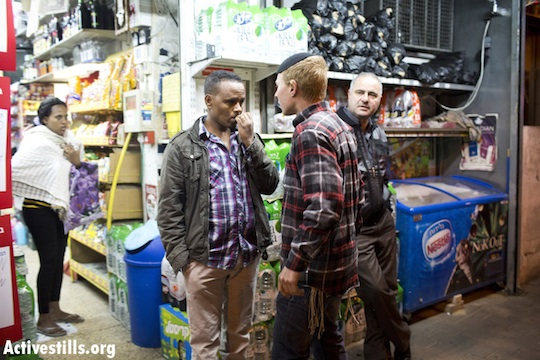Although organized anti-African protests and attacks seem to have become less frequent in south Tel Aviv, a group of friends encounters a new type of organized racism during the city’s “White Night” celebrations.
By Leah McDonnell and Rebecca de Vries

Racial tension in south Tel Aviv is not a new phenomenon, generally taking the form of xenophobic marches, protests and anti-refugee demonstrations. Although the number of protests and participants seems to have diminished, there is a new, developing trend. As of late, there appears to be an increase of smaller, more individualistic attacks against refugees in the south of the city.
As the research I have been working on focuses on the issues of crime in south Tel Aviv, I believe it is safe to say that these incidents are increasing in frequency. Researching this topic has brought me in contact with many people who have suffered from racist attacks (both verbal and physical), but on the evening of June 27th, I became part of my own research.
A group of friends – six of us in total, one happened to be African – went out to partake in the “White Night” festivities taking place throughout the city. The start to the evening was wonderful, with hundreds of people walking around, live music and lots of cheer – people all around were laughing and enjoying themselves. After a few hours, we began to walk back through the busy streets and decided to head south on one of Tel Aviv’s major thoroughfares, Alenby. It was then that our night took a very dark turn.
As we made our way back to south Tel Aviv, two young men wearing matching black security uniforms and yarmulkes approached us. They first asked, “Is the kushi with you?” (Kushi is a derogative Hebrew term for black person.)
A conversation between my friend and the aggressors went as follows:
“He is my boyfriend, leave us alone,” my friend said.
“In that case we have a few questions for you.”
“I am not interested in your questions.”
“Why? Are you an idiot? We are from the security!”
At this point they started screaming at us, demanding to know if we are Jewish, then if we spoke Hebrew. My African friend tried to say, “what happened”, in honest and utter confusion at the events taking place. One of the young men answered by putting his finger to my friend’s face and angrily told him, “you don’t talk.” The other man started to scream, “What happened? What happened,” as if he had been personally offended. He then threateningly brandish a can of pepper spray and yelled, “Jewish girls do not go with Blacks!”
We tried to separate these aggressors from our friend, putting our bodies in between them, yelling, “No, stop, go away!”
The men kept tugging at our friend, trying to push him and us out of their way. We tried to walk away to evade them but they followed us down the street. One of the men tried to punch our friend, but was held back by his accomplice; we can only assume that because we were in front of a store, they did not want to attract any further attention.
They continued following us for a while trying to grab our friend and pushing us out of the way. Three of my friends managed to distract the men, blocking them from our African friend.
We managed to get away but concerned, I ran back to meet my friends who had stayed to distract our attackers. The men had vanished, but my friends told me they had become quite aggressive, pushing and yelling. They had only left when passersby had noticed their alarm and offered to call the police.
Afterwards, we all gathered at a bar to sit and calm ourselves after this terrifying event. Sitting next to me with a troubled look on her face, one of my friends said, “This is the same reaction my grandmother faced in Germany when the Nazis would stop Germans from walking with her [on the street] – because she was Jewish.”
Leah McDonnell is a researcher for a Tel Aviv-based NGO that works with refugees.
